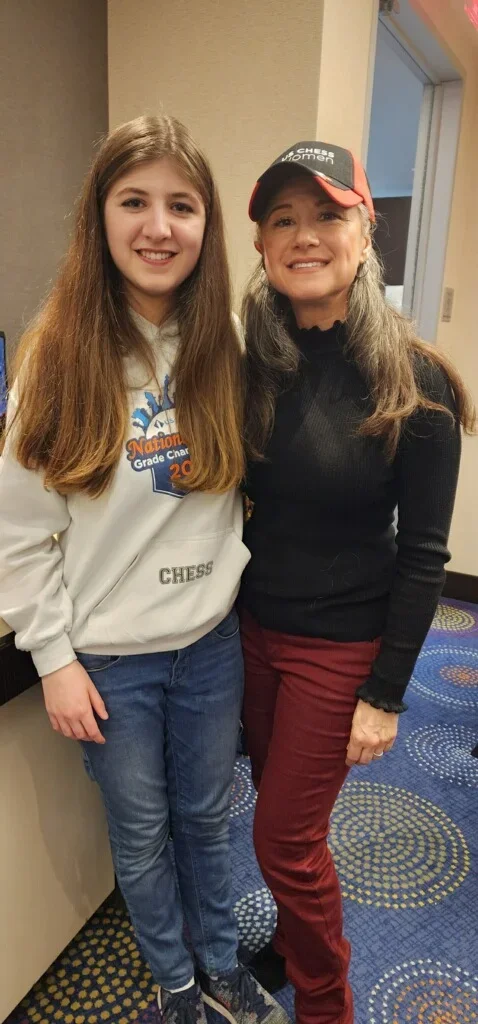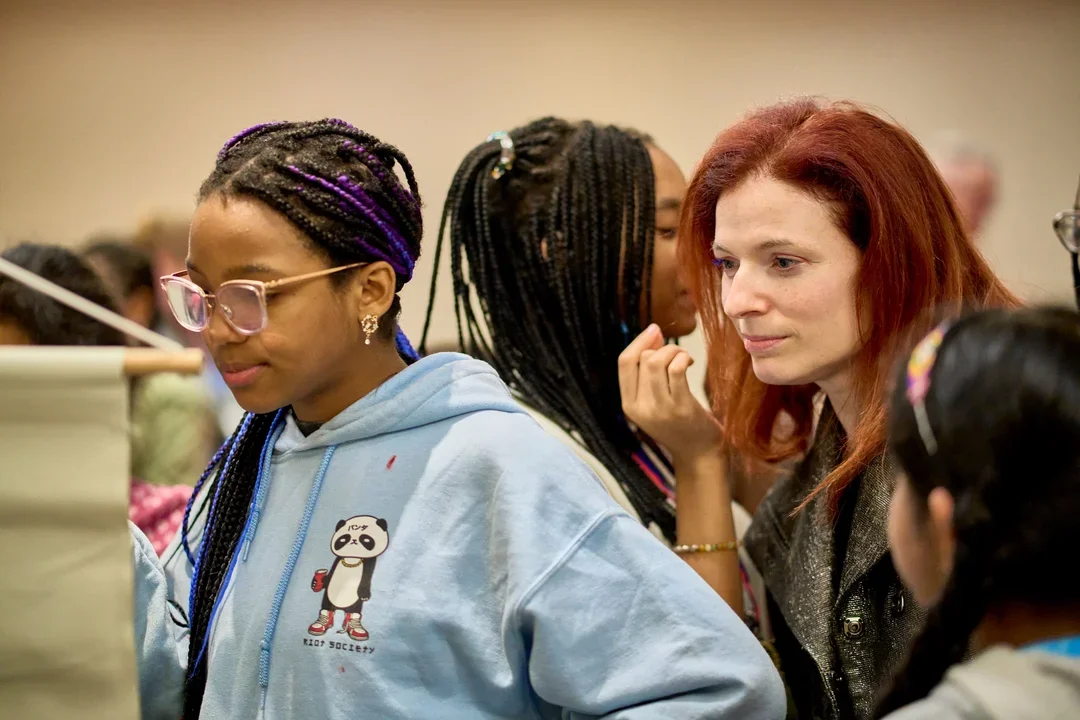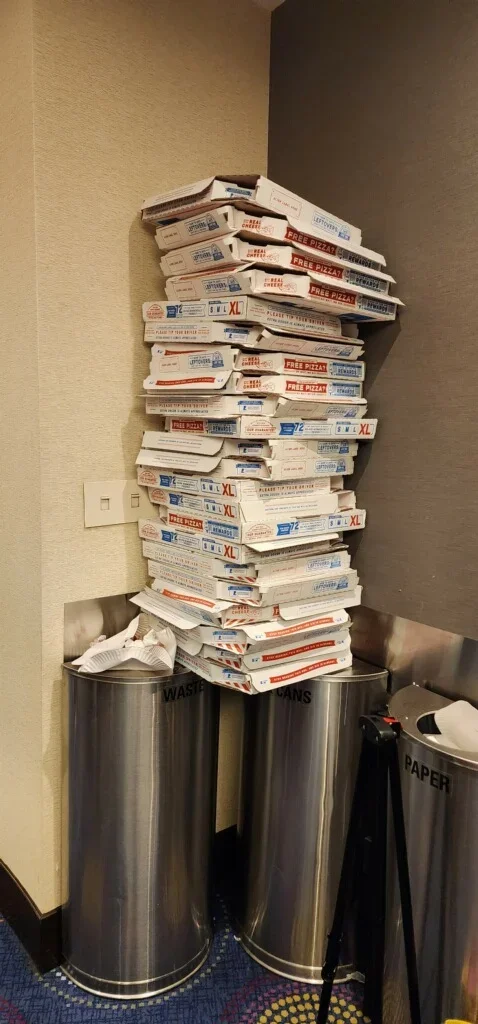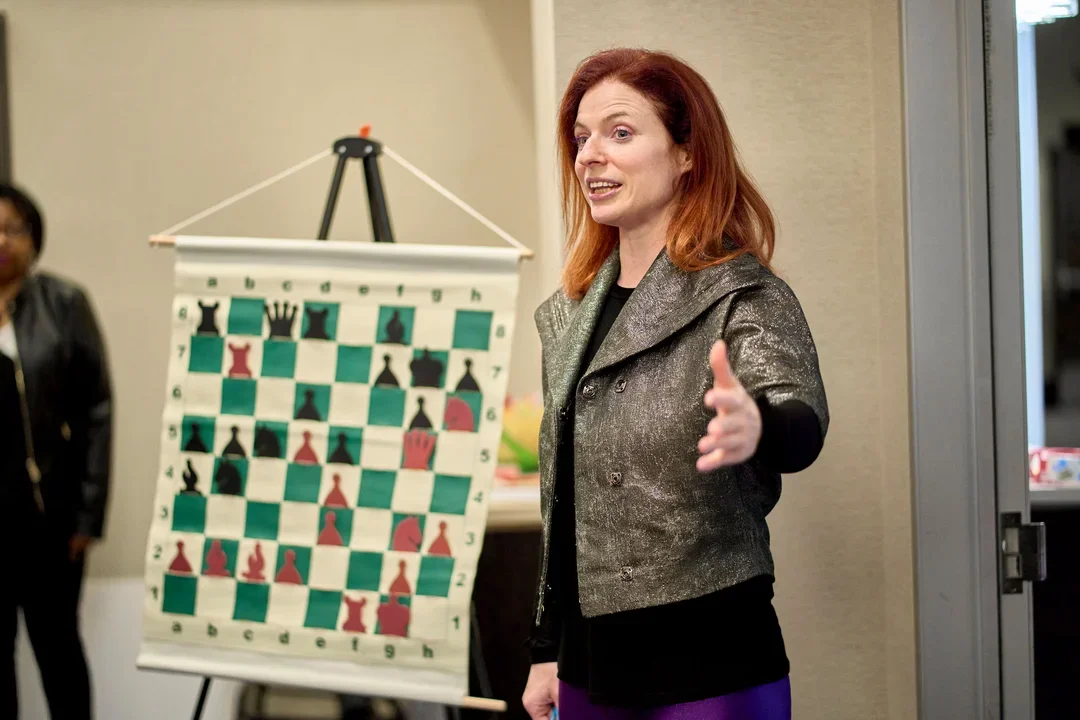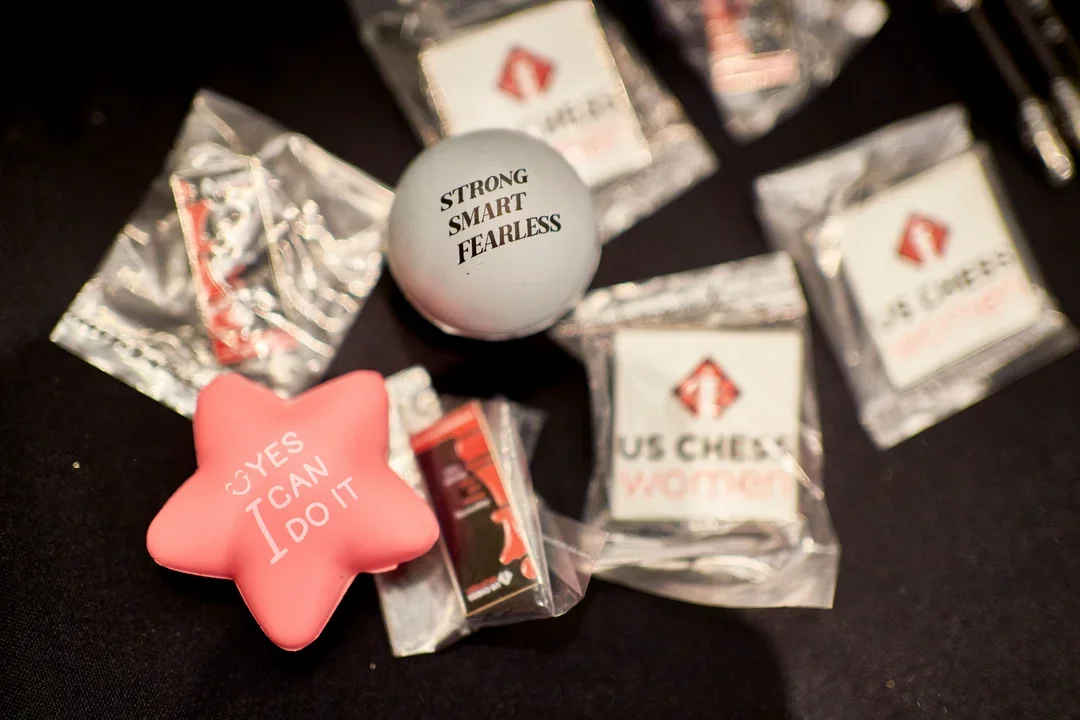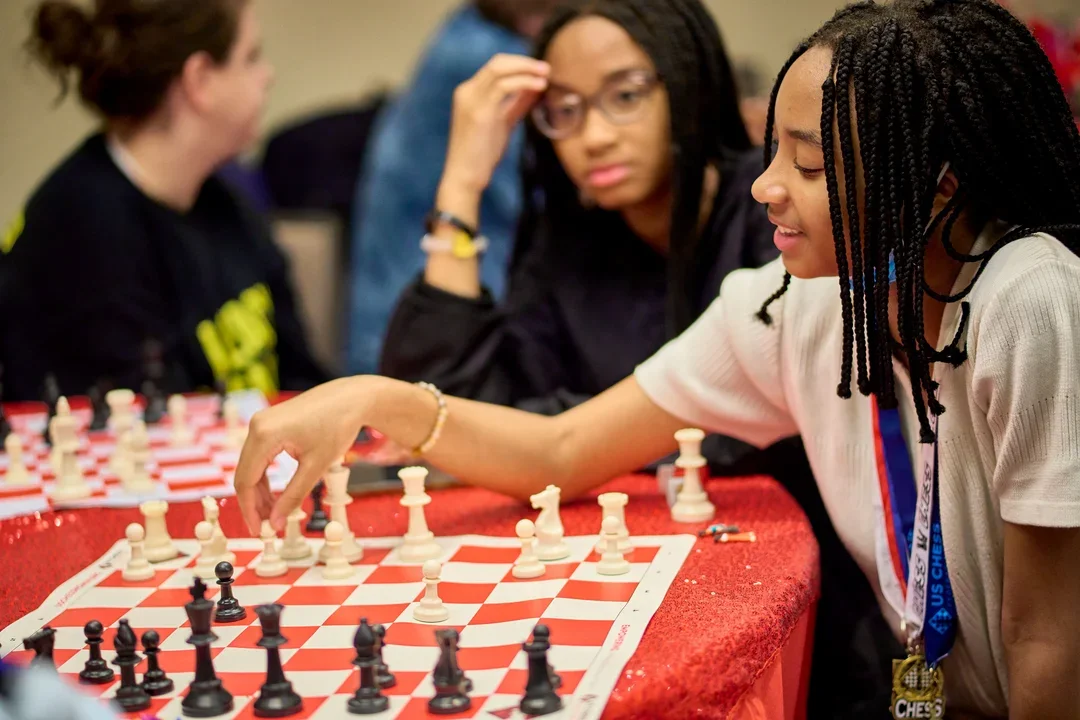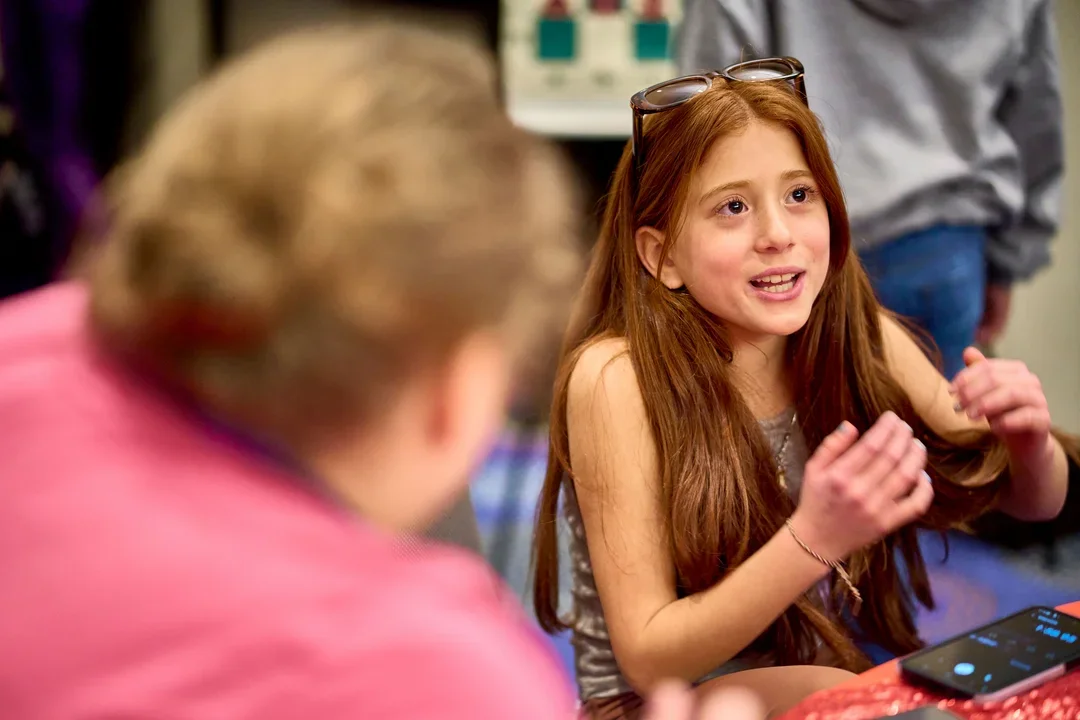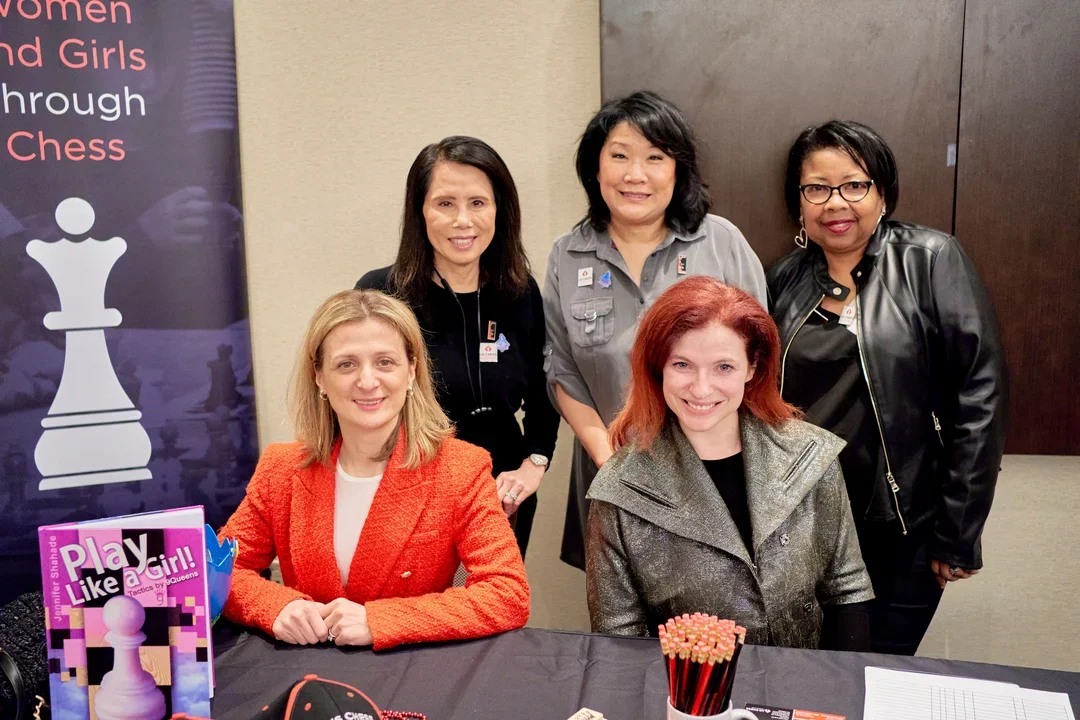Editor's note: This article has been updated on April 2 to include a statement on the live broadcast from April 1.
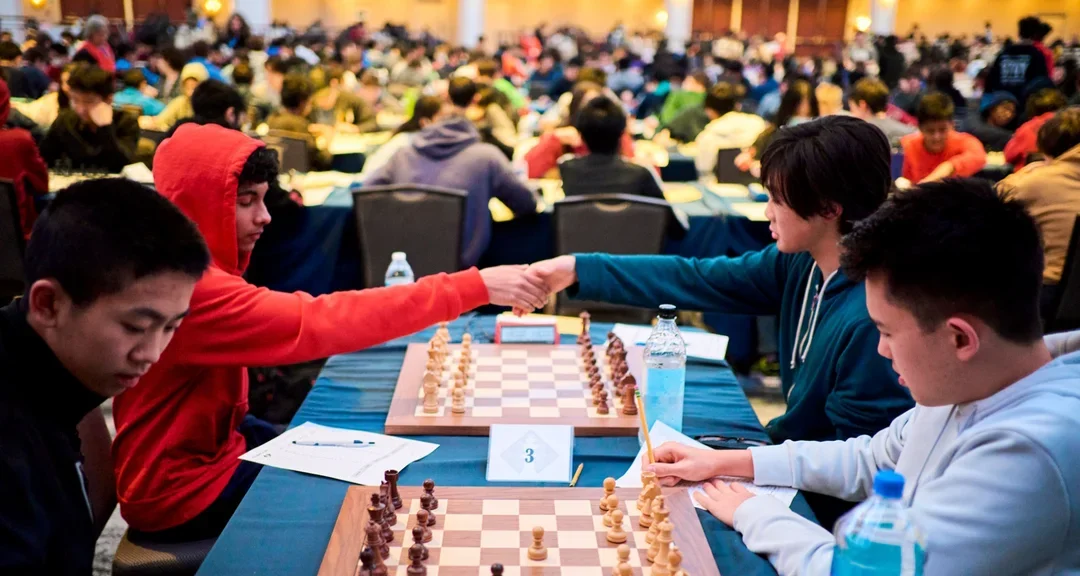
As math would dictate, after five rounds at the 2023 National High School (K-12) Championships, only the large Under 800 section (407 registrants) has more than a few perfect scores remaining.
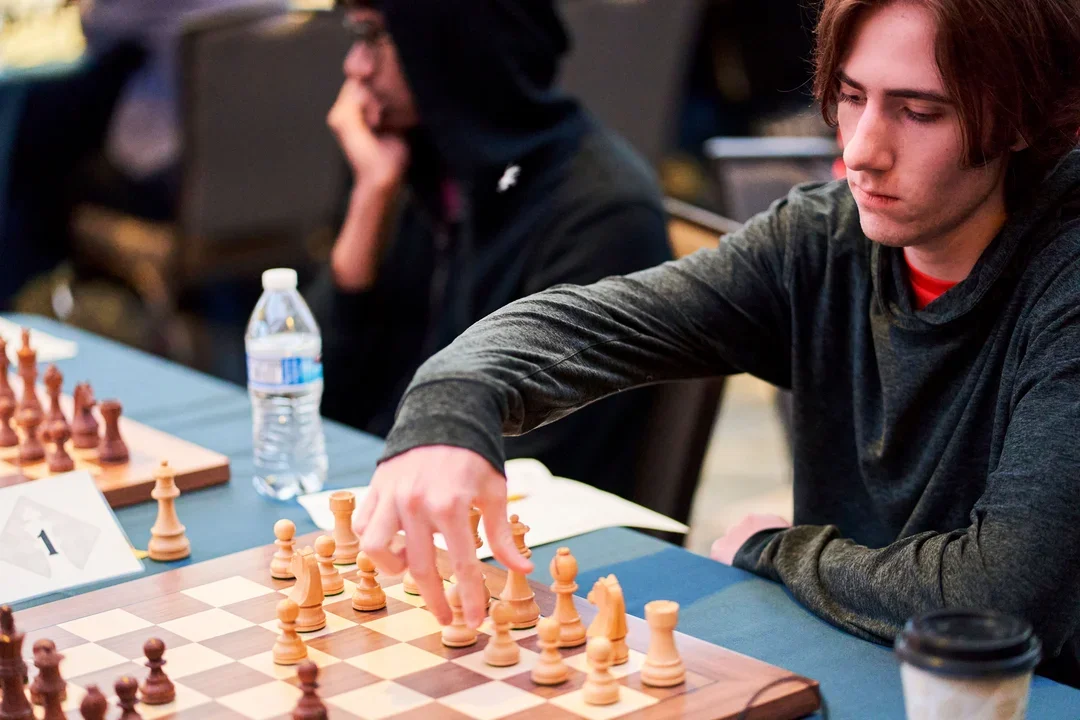
In the Championship section, round six will feature a duel between two FIDE masters, Jason Wang (Ohio) and Gus Huston (New York). Wang has remained perfect since Friday’s first-round scare, and Huston joins him atop the standings after a fantastic attacking upset over overall top seed IM Arthur Guo in round five. Here is Huston dismantling the reigning Denker champ:
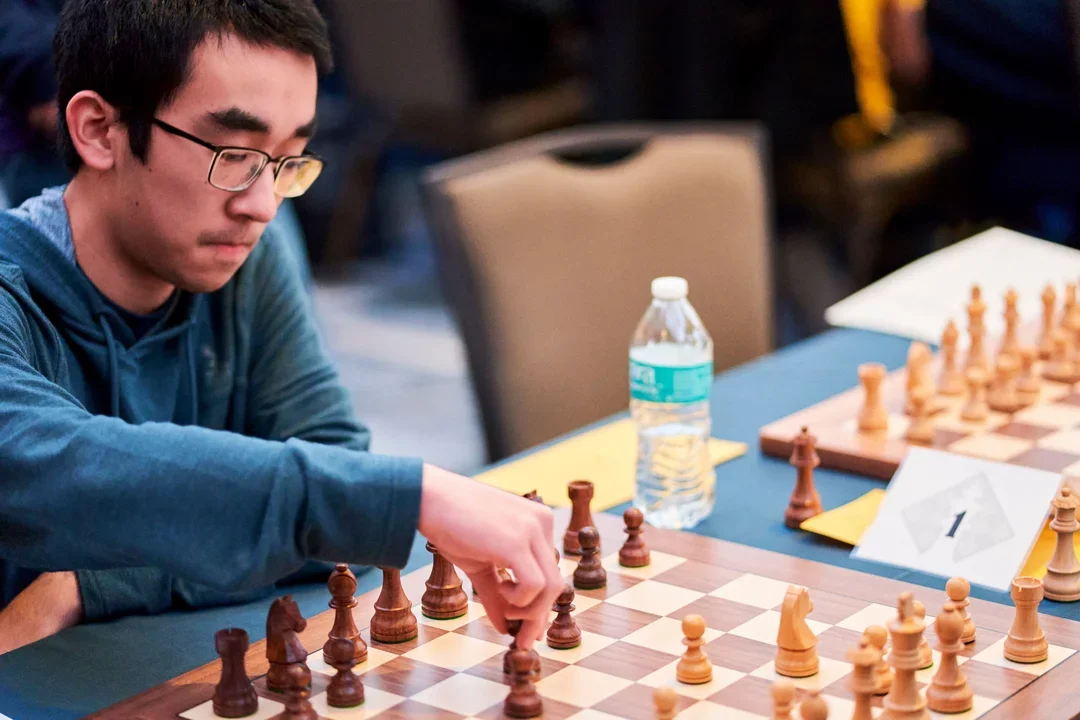
What’s remarkable about Guo’s loss is how similar it looked to his win in the previous round on the other side of a sharp Sicilian.
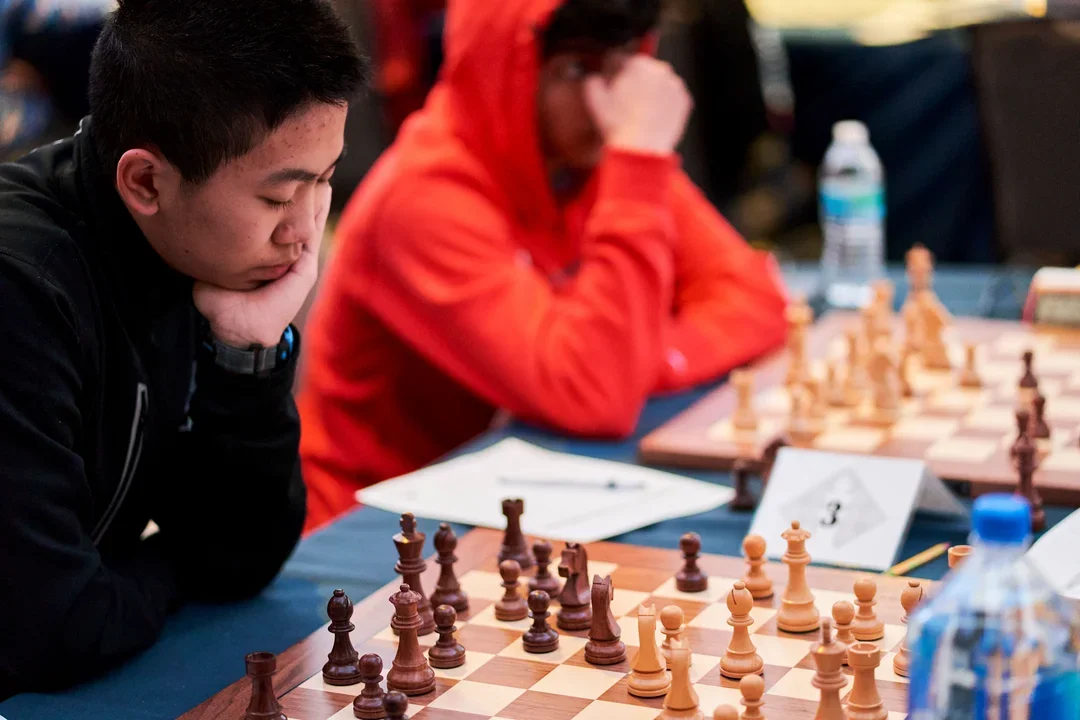
Speaking of nervy Sicilians, Wang found himself in hot water after his opponent threw a speculative, but characteristically complex, “Bxb5” sacrifice against his Taimanov.
Since a perfect score rarely wins the higher sections — especially the Championship section — we cannot ignore the top players who are lurking beneath perfection.
Here are the players who have an unblemished handful of points:
Championship: FM Jason Wang, FM Gus Huston (plus seven players, all rated over 2300, with 4½/5)
Under 1900: Chance Nguyen (all by herself!)
Under 1600: Manuel Alvare, Geah Jean-Baptiste, Simon Kravitz
Under 1200: Zachary Nowell, Lucas Fugate, Andrew Minuti, Noah Hellerslia
Under 800 (8 players – click here)
Unrated: Mohit Maringanti, Vivian Millar-Kellner, Elias Orrell, Aamir Quadri
Here is Nguyen's fifth round win to claim sole first in the under 1900 section. His understanding of dynamics in playing with the isolated queen's pawns is impressive and instructive.
Current leaders after five rounds in the team standings are: Dalton (Championship), Thomas Jefferson (U1900), Julia R. Masterman and Success Academy HS (U1600), Abington HS (U1200), Renaissance HS (U800), and Niles North (Unrated).
Friends & Family Rated Tournament
A robust 35 players competed in this fun side event, with two players landing on top with scores that Magnus Carlsen would be proud of: perfect! Winning all four games were Vladimir Bugayev (NY, 2183) and Georgi Sukhiashvili (NJ, 1905). If I only had a list of first names of the entrants, I still might have picked these two to tie for first!
Girls Room Inspiration and Fun
US Chess Women’s Program Director WGM Jennifer Shahade and special guest IM Rusudan Goletiani inspired the audience in the Girls Club room with key games on their respective paths to winning the U.S. Women’s Chess Championship. A large (and hungry) crowd of girls descended on the team room before the final round to devour 25 pizzas thanks to the generosity of Laurel and Karen (daughter and mother) Aronian!
Scholastic Meeting
For years, as a member of the Scholastic Council, I sat at the front of the room at the Scholastic Meetings facing the audience. This was not my first time in the crowd, but due to the pandemic, it was my first time in a while. Some questions were raised in the meeting, so I thought it would be good to dedicate a little space to give readers (coaches, parents, and players) some more information. As a result, our two teasers from yesterday’s post (Sunil’s unretired K-1 kids a dozen years later, and the mystery of who the unknown bughouse partner is) will be dealt with in tomorrow’s final segment.
At every National Scholastic event, US Chess hosts an open meeting. This brings coaches and parents together, along with the hard-working volunteers and staff to share ideas and information about how our chess events are changing and why. This is a way to give those who do not deal personally with issues such as hotel selection, time control modifications, entry fee increases, section rating limit changes, and many others a closer look at some of the reasoning behind the changes that enable us to continue to thrive as an organization and community.
Venues
Twenty years ago, our numbers at national events were much smaller. Wonderful hotels would court us to see if they could accommodate our 600, 700, or maybe 1,000 players. Those hotels often settled for rotary club meetings, and hoped for weddings, but landing “USCF” (as it was called back then) would be big for them. Now, with only the largest hotels able to accommodate our numbers, US Chess competes with IBM, the White House Correspondents' Association Dinner (yes, they use the DC Hilton!), and other cash-heavy organizations. Contracts at this level are much more favorable to the hotels, and US Chess has to absolutely nail their numbers (of participants) so that they get enough meeting space and guest rooms without contracting for too many. Last year this cost US Chess about $130,000 in penalties due to unsold hotel rooms.
Why So Much?
One question that came up during this meeting was why the cost of attendance for national events keeps rising. Due to inflation, the cost of traveling to, staying at, and dining during these events keeps rising, but as Director of Events Boyd Reed pointed out in the meeting, “That money does not go to US Chess.”
But when costs for entry fees do rise, it’s to ensure that the events are able to maintain their high standards. As costs rise for everyone, it is essential to these events’ success that those who make a living coaching, directing, organizing, and even writing (ahem!) about chess are able to continue to do so. These costs, in other words, might not always translate to larger trophies or swankier hotel accommodations (see above!), but they do ensure that these events continue to go off without a hitch as attendance continues to grow.
As an organizer of state championships for the past 25 years, I look at these national events and commend Boyd Reed, Pete Karagianis (Assistant Director of Events) and their staff who work tirelessly long hours with patience and professionalism. Thank you, US Chess!
Chicago Public Schools program
As costs for attending national events do continue to rise, we will continue to highlight the coaches and organizers who were able to take advantage of Title I Schools National Event grants to ensure these events remain accessible for students who might not otherwise be able to make the trip.
David Heiser, President of the Renaissance Knights Chess Foundation, applied for and received one of the Title I Schools National Event grants on behalf of the Chicago Public Schools’ Academic Chess Competition program. They had schools within their program apply to be selected to bring teams to this event, and coaches at 11 schools were selected to each bring six players. Heiser said that the review committee used a checklist to select the schools, but he emphasized that they really prioritized bringing schools that had never made a trip to Nationals before. This fits with the goal of the CPS program to expose students to new experiences.
Besides the usual seven games, Heiser and his team took the players to some of the Smithsonian museums and also had a “play date” with programs from Baltimore and Kentucky.
Two CPS Students: Camilo and Jaehden
Camilo Alatorre and Jaehden Ayala (both eighth graders at James Monroe Elementary School) were eager to share why they loved chess and how they thought that it benefited them.
Camilo postulated that playing at Nationals gave an extra benefit. “At Nationals, you put more thought into the games, especially with so much time (on the clock).” He felt that he is already improving and said that his favorite thing about this trip was spending time with his chess-playing friends. He believes that chess has helped him “think before moving in life, too.”
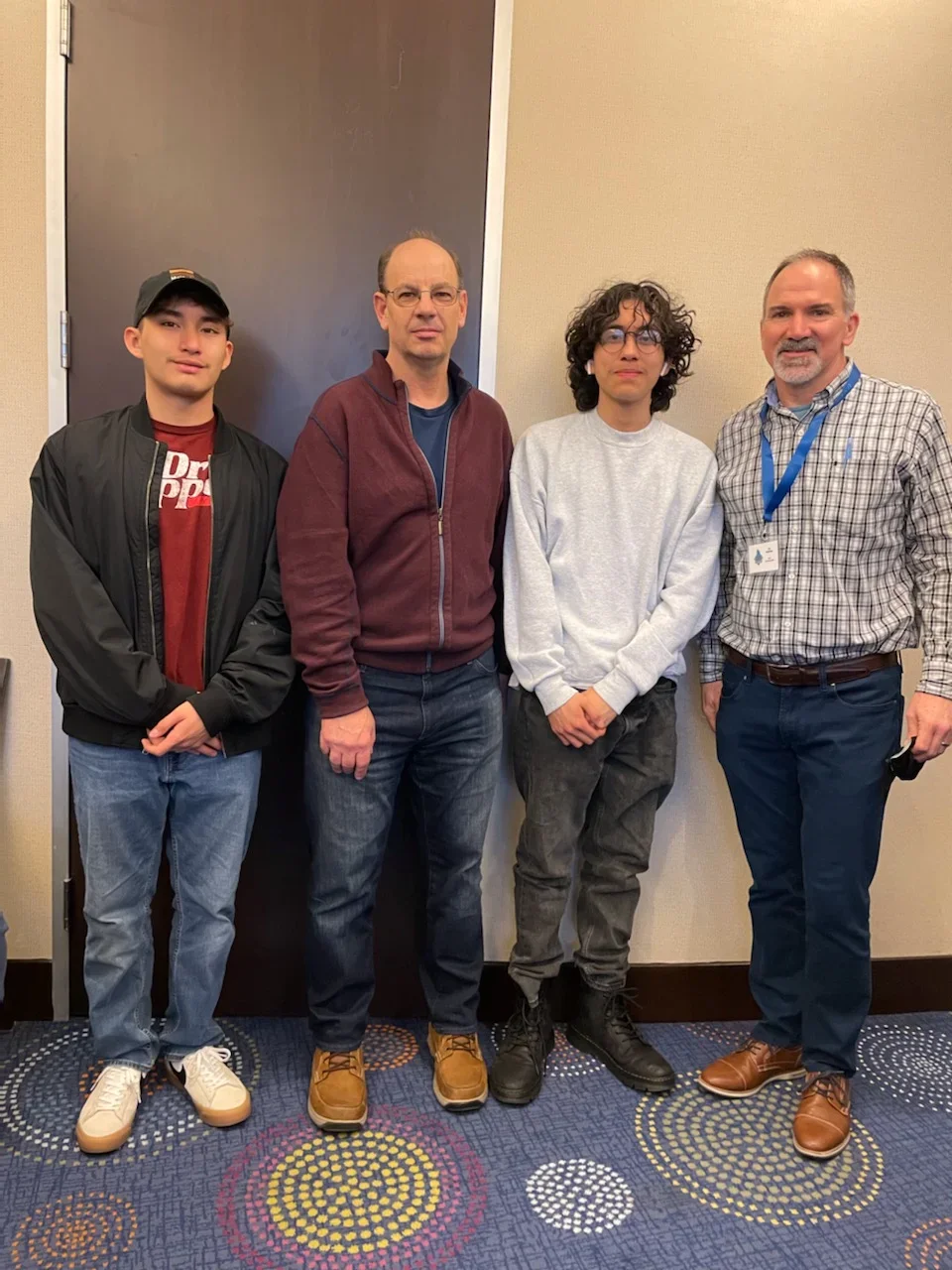
Jaehden enjoyed the casual games against the teams from Baltimore and Kentucky. “It was interesting to learn their different playing styles.” He spoke enthusiastically about his enjoyment of the game: “Making (smart) trades is important. And using your pawns, especially in the endgame.”
One of the popular additions to US Chess national events in recent years has been our live Twitch streaming. Unfortunately, a situation arose on Saturday. US Chess Spokesperson Dan Lucas tells CLO, “During the official US Chess Twitch stream on Saturday, April 1, a player being interviewed exhibited unsportsmanlike behavior by disparaging another player. US Chess has taken immediate steps to prevent this in the future: we will no longer have live player interviews during our streams.
“Chess has a storied history of both sportsmanship and a healthy respect for both opponents and the game itself. We thank the players who uphold this tradition. We are disappointed whenever we see this tradition broken by anyone at our events — whether players, parents, or coaches — and we encourage all participants to practice good sportsmanship principles. We want US Chess national events to be a positive experience for all participants, but especially so for our scholastic competitors.”
Categories
Archives
- January 2026 (6)
- December 2025 (27)
- November 2025 (29)
- October 2025 (39)
- September 2025 (27)
- August 2025 (29)
- July 2025 (43)
- June 2025 (25)
- May 2025 (24)
- April 2025 (29)
- March 2025 (29)
- February 2025 (20)
- January 2025 (24)
- December 2024 (34)
- November 2024 (18)
- October 2024 (35)
- September 2024 (23)
- August 2024 (27)
- July 2024 (44)
- June 2024 (27)
- May 2024 (31)
- April 2024 (51)
- March 2024 (34)
- February 2024 (25)
- January 2024 (26)
- December 2023 (29)
- November 2023 (26)
- October 2023 (37)
- September 2023 (27)
- August 2023 (37)
- July 2023 (47)
- June 2023 (33)
- May 2023 (37)
- April 2023 (45)
- March 2023 (37)
- February 2023 (28)
- January 2023 (31)
- December 2022 (23)
- November 2022 (32)
- October 2022 (31)
- September 2022 (19)
- August 2022 (39)
- July 2022 (32)
- June 2022 (35)
- May 2022 (21)
- April 2022 (31)
- March 2022 (33)
- February 2022 (21)
- January 2022 (27)
- December 2021 (36)
- November 2021 (34)
- October 2021 (25)
- September 2021 (25)
- August 2021 (41)
- July 2021 (36)
- June 2021 (29)
- May 2021 (29)
- April 2021 (31)
- March 2021 (33)
- February 2021 (28)
- January 2021 (29)
- December 2020 (38)
- November 2020 (40)
- October 2020 (41)
- September 2020 (35)
- August 2020 (38)
- July 2020 (36)
- June 2020 (46)
- May 2020 (42)
- April 2020 (37)
- March 2020 (60)
- February 2020 (38)
- January 2020 (45)
- December 2019 (34)
- November 2019 (35)
- October 2019 (42)
- September 2019 (45)
- August 2019 (56)
- July 2019 (44)
- June 2019 (35)
- May 2019 (40)
- April 2019 (48)
- March 2019 (61)
- February 2019 (39)
- January 2019 (30)
- December 2018 (29)
- November 2018 (51)
- October 2018 (45)
- September 2018 (29)
- August 2018 (49)
- July 2018 (35)
- June 2018 (31)
- May 2018 (39)
- April 2018 (31)
- March 2018 (26)
- February 2018 (33)
- January 2018 (30)
- December 2017 (26)
- November 2017 (24)
- October 2017 (30)
- September 2017 (30)
- August 2017 (31)
- July 2017 (28)
- June 2017 (32)
- May 2017 (26)
- April 2017 (37)
- March 2017 (28)
- February 2017 (30)
- January 2017 (27)
- December 2016 (29)
- November 2016 (24)
- October 2016 (32)
- September 2016 (31)
- August 2016 (27)
- July 2016 (24)
- June 2016 (26)
- May 2016 (19)
- April 2016 (30)
- March 2016 (36)
- February 2016 (28)
- January 2016 (32)
- December 2015 (26)
- November 2015 (23)
- October 2015 (16)
- September 2015 (28)
- August 2015 (28)
- July 2015 (6)
- June 2015 (1)
- May 2015 (2)
- April 2015 (1)
- February 2015 (3)
- January 2015 (1)
- December 2014 (1)
- July 2010 (1)
- October 1991 (1)
- August 1989 (1)
- January 1988 (1)
- December 1983 (1)


